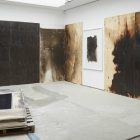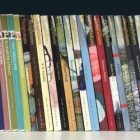The Best Poem I Read This Month: Joey De Jesus’s “Materia VII”
Joey De Jesus’s work transforms itself into the world by coming forth as erasures, formally constrained pieces, vocal metamorphoses, and lyric-doublings. He is aware of the page and the un-page: that is, while rooted in poetic consciousness, he cracks the limiting concept open that there is only a written life or a “real” life. As he explains in a feature curated by Amy King for Poetry Foundation: “I used to want my poems to do things, shit. But now, I just do it. I live it. It’s amazing. I assume a creature consciousness and I’m small—I become the forked tongues of the polycephalic goddess.” The poem and the poet fuse to make an action that, in De Jesus’s work, arrives at moments of saying the “unsayable” and assailing the unassailable.
“Materia VII,” the new poem by Joey De Jesus featured in this month’s WILDNESS, an online literary arts journal published in coordination with Platypus Press, uses several relational jumping off points to supercharge the text-scene. The work, functioning in spaces tangling moments of language and body, is at once ekphrastic and without image. The poem arrives on the heels of a Tarot card by the artist Yoshitaka Amano, specifically “The Chariot”—a card that, though one of the piece’s origins, a head among heads, a singular portion of the “polycephalic goddess,” does not literally appear in the poem. Instead, De Jesus writes a plural-sensory scene that occupies unanswerable lyric moments of descent: all at once a response, a rejuvenation, a recall, a revved wheel, a revival.
The language is primarily monosyllabic, and starts: “i fall from a white horse and see a sky ending in the deep red.” The scene is viewed from below, and what we see in this starting section is an image of a “lion-helmeted god” who “is a bird / and the sun.” But the poem doesn’t seek to reside in this image of overwhelming power, of “burning nova” and the “broadsword razor of his ride.” When the speaker sees the image of an “ending in the deep red,” there is an abundance of apocalyptic notes: the impression is impressive, and so much so that the speaker falls from his position, caught in flashes of a god.
Progressing from this stanza, the speaker closes in on their own position, which is the subject of the poem, if not also the occasion:
i, small made smaller
by the canopy of his shoulders,
curse my size in the alphabet of daggers
what fury enters me?
In order to process the image, self-reflection alights and the speaker realizes their size is shrinking, and curses this with a language made of “daggers.” But what happens next is the entrance of “fury,” until the sensory moments of the aforementioned image blur and “it is a cloud, it is the sound of clouds…/ cocklebur loud.” The relational compactness of the speaker unleashes an embrace of its own microscopic presence: a howl “in the conception of triumph” relates that standing in the shadow of a great force does not unmake, undo, or destroy the lonely presence it might overbear. This is where the poem ends, in a finale of a moment that is a new absence and presence:
in the absence of language i hear
something i have been
and i am neither intimidated nor afraid
In a recent interview with WriterlyStates, De Jesus communicates that he’s “interested in trying to construct language within or around this nebulous oblivion in being so small in comparison to something so great….” This poem, from a continuing series using Tarot as an organizing medium, begins an extended reflection into the relation of the individual to mysterious and mystical forces, and the ways in which a piece of writing can aid that journey and perhaps communicate its trespasses. It makes sense that Joey De Jesus puts his identification “I’m small” and also “I become the forked tongues of the polycephalic goddess” on the same plane, marked only by a hyphen that acts as a bridge, alleyway, or ocean-surface. Spiritual arrivals do not always happen in the grandiose; De Jesus offers a method finding the godhead through a keyhole.



